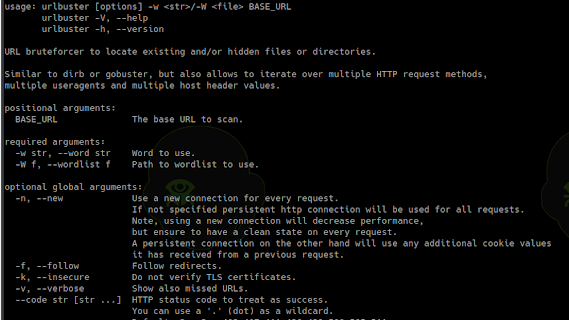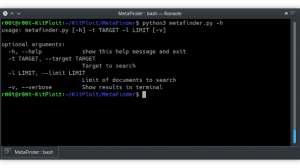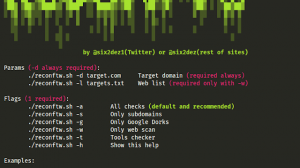[sc name=”ad_1″]
Powerful web directory fuzzer to locate existing and/or hidden files or directories.
Similar to dirb or gobuster, but with a lot of mutation options.
Installation
pip install urlbusterFeatures
- Proxy support
- Cookie support
- Basic Auth
- Digest Auth
- Retries (for slow servers)
- Persistent and non-persistent HTTP connection
- Request methods: GET, POST, PUT, DELETE, PATCH, HEAD, OPTIONS
- Custom HTTP header
- Mutate POST, PUT and PATCH payloads
- Mutate with different request methods
- Mutate with different HTTP headers
- Mutate with different file extensions
- Mutate with and without trailing slashes
- Enumerate GET parameter values
Usage
usage: urlbuster [options] -w <str>/-W <file> BASE_URL
urlbuster -V, --help
urlbuster -h, --version
URL bruteforcer to locate existing and/or hidden files or directories.
Similar to dirb or gobuster, but also allows to iterate over multiple HTTP request methods,
multiple useragents and multiple host header values.
positional arguments:
BASE_URL The base URL to scan.
required arguments:
-w str, --word str Word to use.
-W f, --wordlist f Path to wordlist to use.
optional global arguments:
-n, --new Use a new connection for every request.
If not specified persistent http connection will be used for all requests.
Note, using a new connection will decrease performance,
but ensure to have a clean state on every request.
A persistent connection on the other hand will use any additional cookie values
it has received from a previous request.
-f, --follow Follow redirects.
-k, --insecure Do not verify TLS certificates.
-v, --verbose Show also missed URLs.
--code str [str ...] HTTP status code to treat as success.
You can use a '.' (dot) as a wildcard.
Default: 2.. 3.. 403 407 411 426 429 500 505 511
--payload p [p ...] POST, PUT and PATCH payloads for all requests.
Note, multiple values are allowed for multiple payloads.
Note, if duplicates are specified, the last one will overwrite.
See --mpayload f or mutations.
Format: <key>=<val> [<key>=<val>]
--header h [h ...] Custom http header string to add to all requests.
Note, multiple values are allowed for multiple headers.
Note, if duplicates are specified, the last one will overwrite.
See --mheaders for mutations.
Format: <key>:<val> [<key>:<val>]
--cookie c [c ...] Cookie string to add to all requests.
Format: <key>=<val> [<key>=<val>]
--proxy str Use a proxy for all requests.
Format: http://<host>:<port>
Format: http://<user>:<pass>@<host>:<port>
Format: https://<host>:<port>
Format: https://<user> ;:<pass>@<host>:<port>
Format: socks5://<host>:<port>
Format: socks5://<user>:<pass>@<host>:<port>
--auth-basic str Use basic authentication for all requests.
Format: <user>:<pass>
--auth-digest str Use digest authentication for all requests.
Format: <user>:<pass>
--timeout sec Connection timeout in seconds for each request.
Default: 5.0
--retry num Connection retries per request.
Default: 3
--delay sec Delay between requests to not flood the server.
--output file Output file to write results to.
optional mutating arguments:
The following arguments will increase the total number of requests to be made by
applying various mutations and testing each mutation on a separate request.
--method m [m ...] List of HTTP methods to test each request against.
Note, each supplied method will double the number of requests.
Supported methods: GET POST PUT DELETE PATCH HEAD OPTIONS
Default: GET
--mpayload p [p ...] POST, PUT and PATCH payloads to mutate all requests..
Note, multiple values are allowed for multiple payloads.
Format: <key>=<val> [<key>=<val>]
--mheader h [h ...] Custom http header string to add to mutate all requests.
Note, multiple values are allowed for multiple h eaders.
Format: <key>:<val> [<key>:<val>]
--ext ext [ext ...] List of file extensions to to add to words for testing.
Note, each supplied extension will double the number of requests.
Format: .zip [.pem]
--slash str Append or omit a trailing slash to URLs to test.
Note, a slash will be added after the extensions if they are specified as well.
Note, using 'both' will double the number of requests.
Options: both, yes, no
Default: no
misc arguments:
-h, --help Show this help message and exit
-V, --version Show version information
examples
urlbuster -W /path/to/words http://example.com/
urlbuster -W /path/to/words http://example.com:8000/
urlbuster -k -W /path/to/words https:/ /example.com:10000/Mutation example
Some websites behave differently for the same path depending on the specified useragent.
$ urlbuster
-W /usr/share/dirb/wordlists/common.txt
--mheader 'User-Agent:Googlebot/2.1 (+http://www.googlebot.com/bot.html)'
--method 'POST,GET,DELETE,PUT,PATCH'
http://www.domain.tld/ ██╗ ██╗██████╗ ██╗ ██████╗ ██╗ ██╗███████╗████████╗███████╗██████╗
██║ ██║██╔══██╗██║ ██╔══██╗██║ ██║██╔════╝╚══██╔══╝██╔════╝██╔══██╗
██║ ██║██████╔╝██║ ██████╔╝██║ ██║███████╗ ██║ █████╗ ██████╔╝
██║ ██║██╔══██╗██║ ██╔══██╗██║ ██║╚════██║ ██║ ██╔══╝ ██╔══██╗
╚██████╔╝██║ ██║███████╗██████╔╝╚██████╔╝███████║ ██║ ███████╗██║ ██║
╚═════╝ ╚═╝ ╚═╝╚══════╝╚═════╝ ╚═════╝ ╚══════╝ ╚═╝ ╚══════╝╚═╝ ╚═╝
0.5.0 by cytopia
SETTINGS
Base URL: https://www.everythingcli.org/
Valid codes: 2.., 3.., 403, 407, 411, 426, 429, 500, 505, 511
Connection: Non-persistent
Redirects: Don't follow
Payloads: None
Timeout: 5.0s
Retries: 3
Delay: None
MUTATIONS
Mutating headers: 2
Mutating payloads: 0 (POST)
Methods: 5 (POST, GET, DELETE, PUT, PATCH)
Slashes: no
Extensions: 1 (empty extension)
Words: 4614
TOTAL REQUESTS: 46140
START TIME: 2020-01-29 08:52:12
--------------------------------------------------------------------------------
Connection: keep-alive
Accept-Encoding: gzip, deflate
Accept: */*
User-Agent: python-requests/2.22.0
[301] [GET] http://domain.tld/robots.txt
--------------------------------------------------------------------------------
Connection: keep-alive
Accept-Encoding: gzip, d eflate
Accept: */*
User-Agent: Googlebot/2.1 (+http://www.googlebot.com/bot.html)
[200] [GET] http://domain.tld/robots.txt
[301] [POST] http://domain.tld/robots.txt
[301] [GET] http://domain.tld/robots.txt
[301] [DELETE] http://domain.tld/robots.txt
[301] [PUT] http://domain.tld/robots.txt
[301] [PATCH] http://domain.tld/robots.txtExamples
Default usage
Basic
$ urlbuster
-W /path/to/wordlist.txt
http://www.domain.tld/Proxy through Burpsuite
$ urlbuster
-W /path/to/wordlist.txt
--proxy 'http://localhost:8080'
http://www.domain.tld/Save results to file
$ urlbuster
-W /path/to/wordlist.txt
--output out.txt
http://www.domain.tld/Scan behind Basic Auth
$ urlbuster
-W /path/to/wordlist.txt
--auth-basic 'user:pass'
http://www.domain.tld/Use session cookie
$ urlbuster
-W /path/to/wordlist.txt
--cookie 'PHPSESSID=a79b00e7-035a-2bb4-352a-439d855feabf'
http://www.domain.tld/Find files
Find files in root directory
$ urlbuster
-W /path/to/wordlist.txt
--code 200 301 302
--ext .zip .tar .tar.gz .gz .rar
http://www.domain.tld/Find files in sub directory
$ urlbuster
-W /path/to/wordlist.txt
--code 200 301 302
--ext .zip .tar .tar.gz .gz .rar
http://www.domain.tld/wp-content/Advanced usage
Bruteforce query parameter
$ urlbuster
-W /path/to/wordlist.txt
--method GET
--code 200 301 302
http://www.domain.tld/search?q=Bruteforce POST requests
$ urlbuster
-W /path/to/wordlist.txt
--code 200 301 302
--method POST
--payload
'user=somename'
'pass=somepass'
'[email protected]'
'submit=yes'
http://www.domain.tld/Bruteforce mutated POST requests
$ urlbuster
-w index.php
--code 200 301 302
--method POST
--mpayload
'user=somename1'
'user=somename2'
'user=somename3'
'pass=somepass1'
'pass=somepass2'
'pass=somepass3'
'[email protected]'
'[email protected]'
'[email protected]'
'submit=yes'
http://www.domain.tld/wp-admin/Useragent SQL injections
$ urlbuster
-W /path/to/wordlist.txt
--code 5..
--method GET POST
--mheader
"User-Agent: ;"
"User-Agent: ' or ""
"User-Agent: -- or #"
"User-Agent: ' OR '1"
"User-Agent: ' OR 1 -- -"
"User-Agent: " OR 1 = 1 -- -"
"User-Agent: '='"
"User-Agent: 'LIKE'"
"User-Agent: '=0--+"
"User-Agent: OR 1=1"
"User-Agent: ' OR 'x'='x"
"User-Agent: ' AND id IS NULL; --"
http://www.domain.tld/Find potential vhosts
$ urlbuster
-w /
--method GET POST
--mheader
"Host: internal1.lan"
"Host: internal2.lan"
"Host: internal3.lan"
"Host: internal4.lan"
"Host: internal5.lan"
"Host: internal6.lan"
http://10.0.0.1cytopia sec tools
Below is a list of sec tools and docs I am maintaining.
| Name | Category | Language | Description |
|---|---|---|---|
| offsec | Documentation | Markdown | Offsec checklist, tools and examples |
| header-fuzz | Enumeration | Bash | Fuzz HTTP headers |
| smtp-user-enum | Enumeration | Python 2+3 | SMTP users enumerator |
| urlbuster | Enumeration | Python 2+3 | Mutable web directory fuzzer |
| netcat | Pivoting | Python 2+3 | Cross-platform netcat |
| badchars | Reverse Engineering | Python 2+3 | Badchar generator |
| fuzza | Reverse Engineering | Python 2+3 | TCP fuzzing tool |
[sc name=”ad-in-article”]





















Add Comment